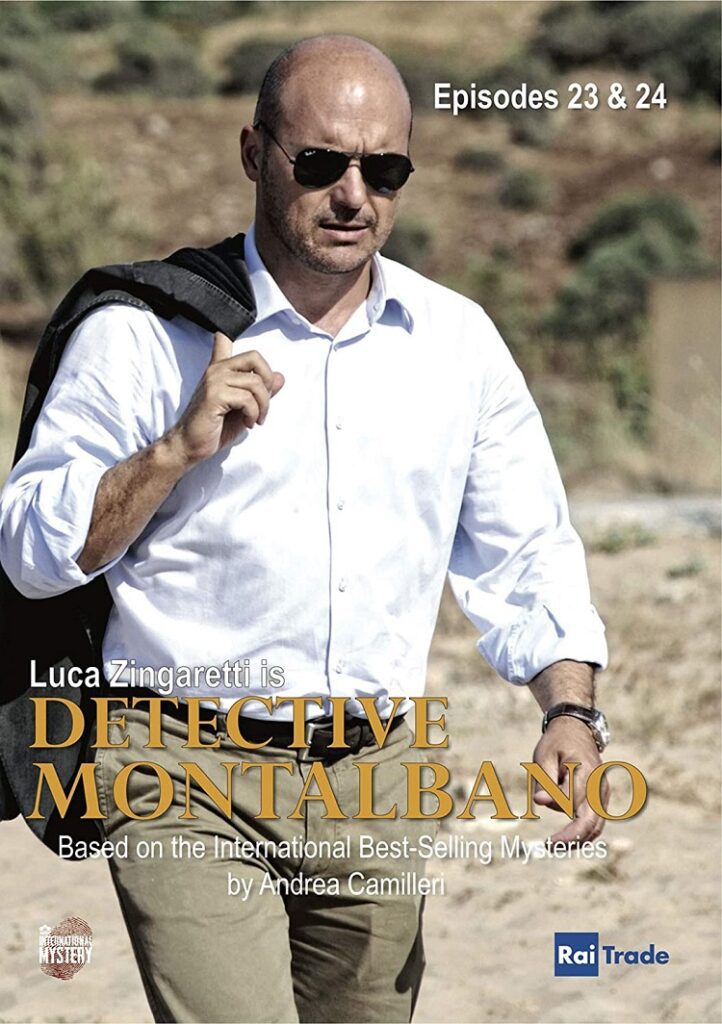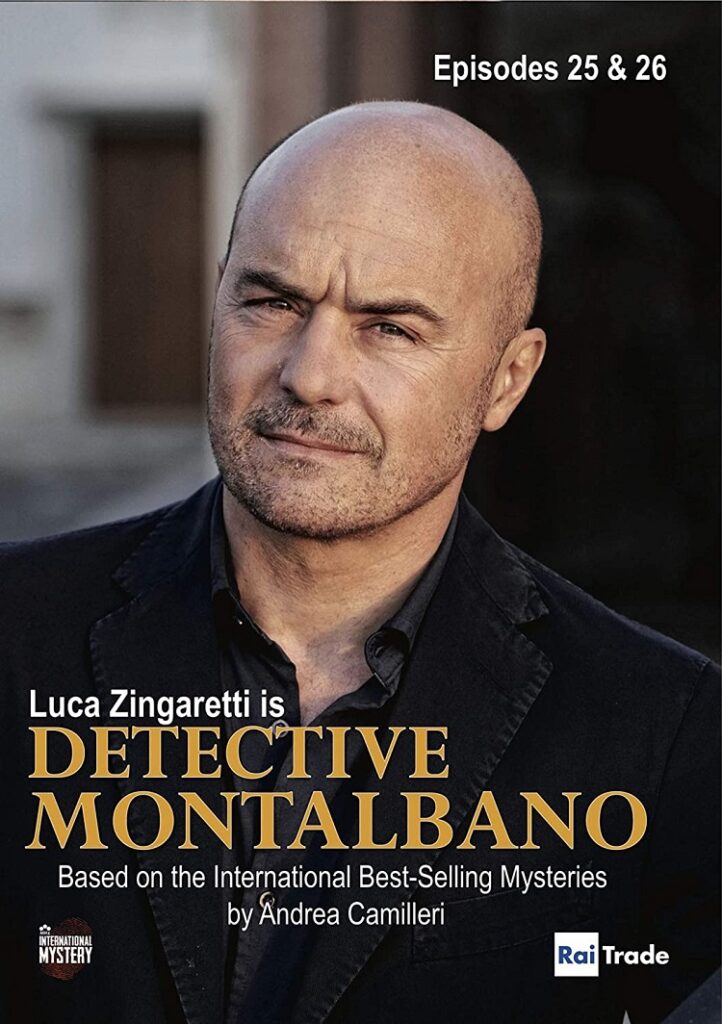
Inspector Montalbano (Il commissario Montalbano) is a popular Italian crime drama based upon the detective novels of Andrea Camilleri. It stars Luca Zingaretti as Detective Salvo Montalbano (though he acts more like a police chief or at least a detective supervisor and in fact there is some internet debate over whether or not the title is mis-translated and should instead be something like Commissioner Montalbano, but I digress) who solves crime in the fictional town of Vigata, Sicility.
Assisting him are his deputy Mimi (Cesare Bocci), Detective Fazio (Peppino Mazzotta) and the bumbling assistant Catarella (Angelo Russo.) Like most European crime dramas, each episode of Detective Montalbano is more like a full-on movie, lasting anywhere from 90 to 110 minutes. These two sets contain two disks each for a total of four movies and complete the entire ninth season of the show (or episodes 23-26 if you prefer.)
Truth be told, I paused the first episode (Angelica’s Smile) about halfway though and sighed wondering how I was going to make it through all four movies of this terrible series. I felt it was cheesy, not at all funny, poorly directed and edited and shot, and overall just really not very good. But as a good reviewer I turned it back on and plugged my way through. However, by the episode’s end my mood had lightened. It wasn’t nearly as bad as I thought. I watched the next one and the next and the next and by the fourth movie I was hooked. This was actually pretty good.
The problem was that this was season nine. By now the writers are very comfortable with their setting, their characters, and what they want to do with the show. They don’t need to explain everything up front but can let fans enjoy the ongoing jokes and character development. As an outsider coming to the show for the first time, I felt lost. It’s like having inside jokes with your old friends where someone might reference something in the past and everybody laughs. Except the new guy who has no idea what anybody is talking about.
During that first episode, I was the new guy looking in. I didn’t understand that while Catarella gets nearly everything wrong, he’s tolerated as a member of the force, or that Montelbano’s girlfriend Livia (Katharina Böhm) is often not around because she lives and works in another town. Etc. But as I continued watching more episodes I began to understand the ins and outs of the shows and the repetitions became familiar.

Zingaretti is terrific as Montalbano. He’s big, bold, and tough when he has to be, but exceedingly polite and kind as well. He knows how to play all the games and can trick even the best of criminals, but can also show leniency when needed and repeatedly helps out the people of his town even when his duty does not demand it. He knows all the top mafiosos around and while he’d love to arrest them he also knows they can be helpful in supplying information when it suits them so he stays friendly. He’s also quite the ladies man, despite having a steady girlfriend. In nearly every episode there is some beautiful woman trying to seduce him.
Mimi and Fazio are likewise excellent. Mimi is suave and sophisticated and is often called upon to seduce various ladies in order to gain inside information. While Fazio does all the legwork, dutifully following orders and getting things done. Catarella is there for comic relief. He’s always bumping into things and smashing others in a fit of slapstick. He cannot take a phone message without screwing up the person’s name or the location of a crime. He’s one of the reasons it took me a while to warm up to the show. The comedy there is so broad and silly that at first I just rolled my eyes, but as I saw more of him his antics warmed me up and I began to laugh.
While the comedy throughout is broad, the drama is more focused and complex. Each movie involves a series of crimes that lead the detectives down various dead ends before slowly they discover the true culprit. There is a reliance on House-esque revelations that come from every day moments that grows pretty tired but overall the mysteries are very enjoyable.
Strangely they chose an Austrian to play the girlfriend, Livia, who does not speak a word of Italian and therefore must be dubbed by someone who does. It is an incredibly weird choice and the character is not so important, and the actress not so wonderful that you can’t see any reason for it. Surely there was an Italian actress who could fit the part. Not speaking Italian myself, I didn’t notice all that much except that on occasion I could tell the sync was off.
It is a very Italian series and reading up on it they say it deals with a lot of contemporary Italian issues and is somewhat satirical against Sicilian and Italian police. None of that translates to this American, but it doesn’t really matter. There were definitely moments where I could tell some of the subtlety was being lost in translation, especially during some of the more comedic moments, but it never really bothered me.
The editing in the series is a bit odd and the transitions need a lot of work. For example there is one scene in which Montelbano is just sitting down to lunch with Fazio. Fazio mentions that there is a bullet hole in Montelbano’s car and the scene jumps to the two of them checking out the hole. Next thing we know Fazio is driving the car to have the bullet pulled out of the hole and Montelbano is walking away. Wait, what happened to lunch? They must have ate it in the transition, but the editing is done so poorly it feels like they just skipped the food. There are numerous moments like this where I had to pause a moment and realized that time has passed between edits and that they had just done the transitions so poorly that you have to be paying attention.
The four movies included in these two sets are as follows:
Angelica’s Smile: A series of robberies are being committed amongst the rich, elite citizens of Vigata. One of the victims is Angelica, a beautiful, magnetic woman who mesmerizes and seduces Montalbano. Distracted by her, it takes him awhile to realize that the burglaries are in fact meant as a distraction to cover for something completely different.
Mirror Effect: Taking inspiration from Orson Welles’ The Lady From Shanghai, this movie deals with a series of mysterious explosions in front of empty garages and complicated murders that makes the detective wonder what is real and what is not.
A Voice in the Night: When a theft occurs at a Mafia-controlled supermarket, Montelbano must break the rules and use unconventional methods to catch the perp.
A Ray of Light: Hunting down some arms traffickers, Montalbano enlists Mimi to seduce a beautiful woman who may be mixed up in it.
Each DVD comes with a short behind the scenes clip. Lasting no more than three minutes each, half of which is taken up by clips from the show, the clips are just short interviews with the female co-star of each movie, none of which add any real insight and one wonders why they were even included.
Detective Montelbano is a very enjoyable series. After having watched a lot of cold, dark, dreary Scandanavian dramas, it’s nice to get a little Sicilian sun and be able to laugh at murder again. It isn’t perfect by any means, but its a lot of fun. As a comparison I’d put it in league with something like Monk or Moonlighting, with big laughs but serious drama as well.